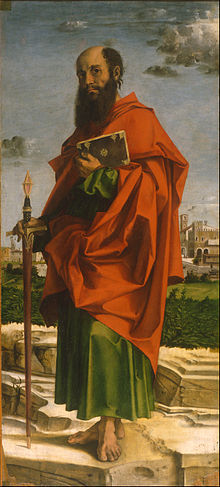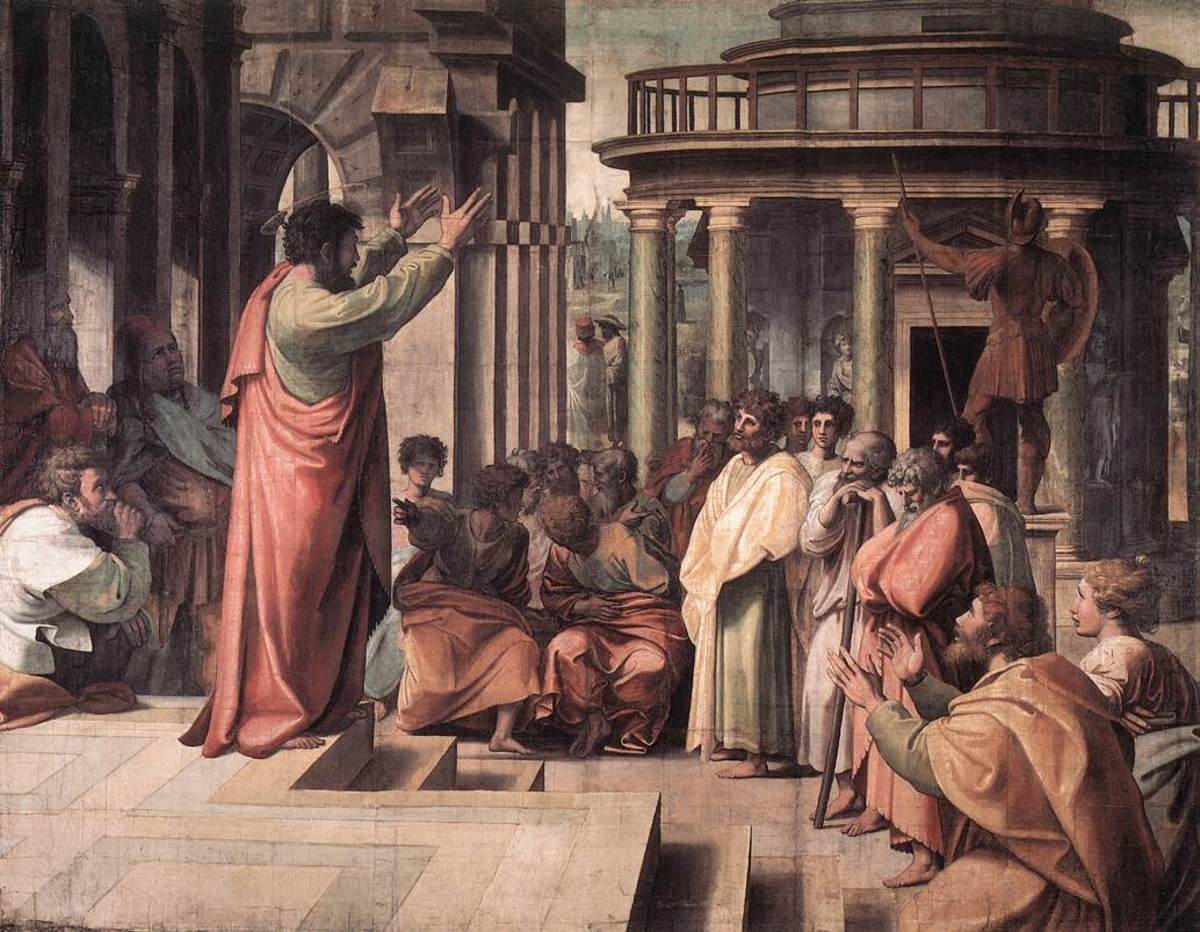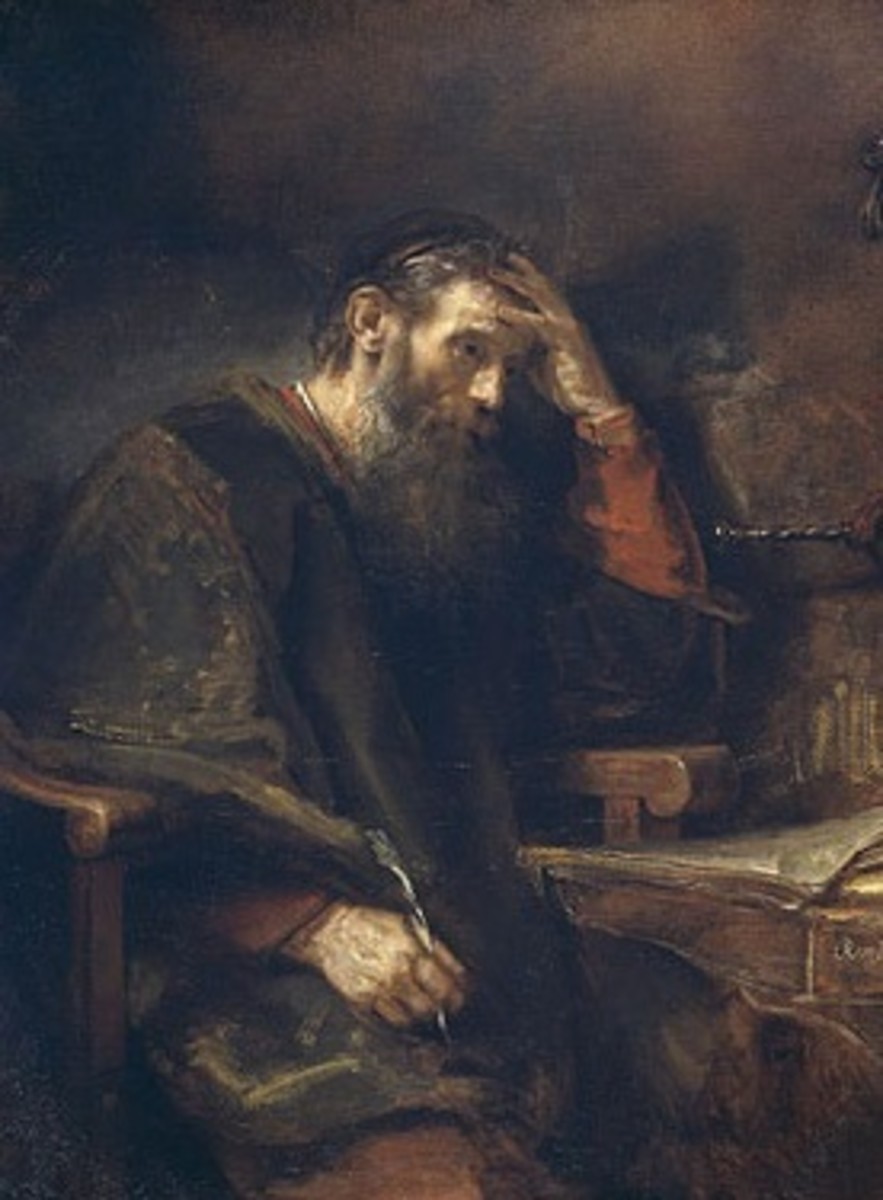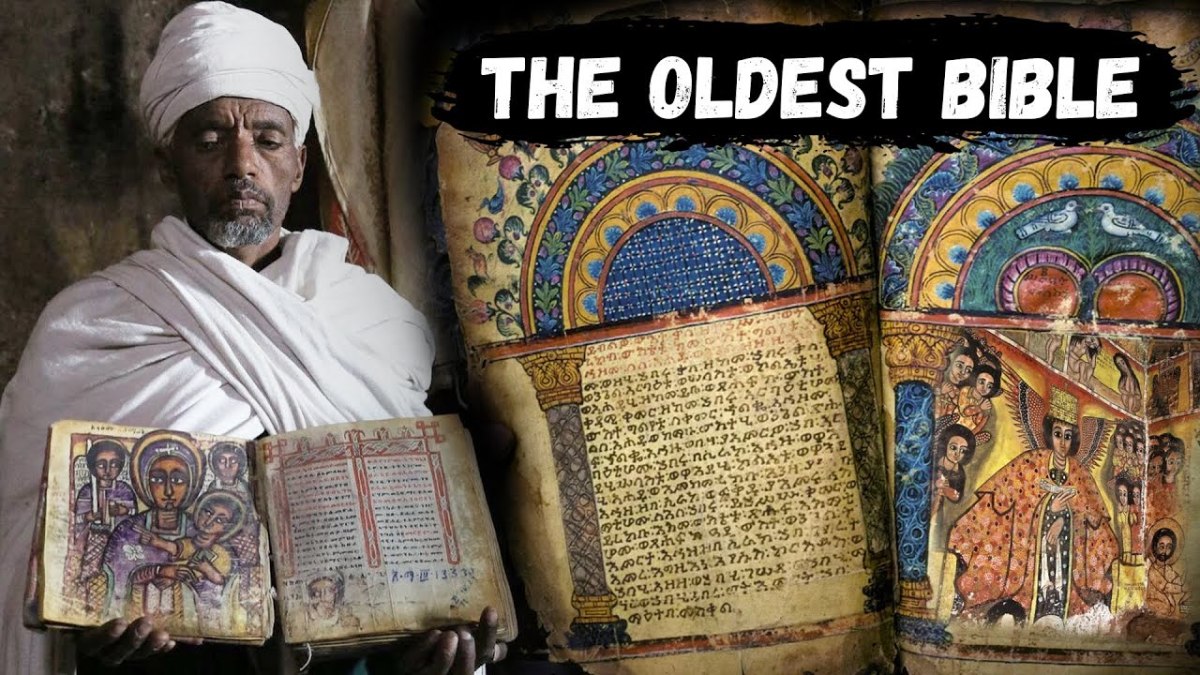Bible: What Does 2 Corinthians 12-13 Teach Us About Paul and Apostleship?
The Apostle Paul

Paradise

"Thorn in the Flesh"
What do you think was Paul's "thorn in the flesh"?
A Little Foolishness
Paul, tongue-in-cheek, laments that his boasting will undoubtedly not bear fruit, but he continues to list his credentials including “visions and revelations of the Lord” (v. 1).
Speaking in the third person, he recounts an experience “a man in Christ” had fourteen years earlier.
The apostle does not know whether he made this visit into God’s presence (“the third heaven” [v. 2]; “Paradise” [v. 4a]) in spirit or in the flesh (v. 2), but he asserts that God knows which mode it was (vv. 2b, 3b).
The Spirit of God (presumably) transported (“caught up”) Paul to glory where he heard a language that God forbade him to repeat (v. 4).
Again, he facetiously does not identify himself as this person, so that he can boast about him.
To poke fun at his adversaries, Paul claims to boast about himself only with regard to his infirmities (v. 5).
He wants his opponents to base their judgments of him only upon tangible evidence (“what he sees me to be or hears from me”), so he keeps himself from boasting foolishly (v. 6).
Paul finally identifies himself as this man in Christ whom God took into His presence, since he now refers to an infirmity—“a thorn in the flesh . . . a messenger of Satan”—the Lord gave to humble him (“lest I should be exalted above measure by the abundance of the revelations,” “lest I be exalted above measure”) [v. 7].
[Note that the apostle reiterates the purpose of the thorn.]
Paul remarks that after he asked God three times to remove the undisclosed difficulty, the Lord responded that He would give him sufficient grace—that is, spiritual strength—not only to enable him to endure the pain, but also to make his weakened body a better conduit through which God could demonstrate His strength (vv. 8-9a).
The apostle humbly submitted to the Lord’s wise plan for his life, knowing that bodily weakness is a small price to pay to experience the power of God.
In this particular “thorn” and other infirmities, he says he will boast (v. 9b), for he recognizes that God will use him to accomplish wonders if he acquiesces to His will and gives Him the glory (v. 10).
Paul acknowledges that he has been boasting like a fool, but argues that the Corinthians forced him to go to this length.
Although the apostle recognizes that in himself he is “nothing,” he also points out that in no respect does he trail behind “the most eminent apostles.”
Having witnessed all of the miraculous evidence of Paul’s apostleship, the Corinthians should have spoken well of him (vv. 11-12).
Paul sarcastically asks forgiveness from them for not sponging off them (v. 13).
The apostle reports that he is prepared to visit Corinth a third time not to seek any remuneration from them, but to help them spiritually.
Just as parents save their pennies to provide for their children’s future, so Paul stands ready to spend his means to ensure their continued spiritual growth (v. 14).
Even though certain opponents in Corinth show him little respect and affection despite his great love for them, Paul remains willing to give of himself to increase their welfare (v. 15).
Attempting to think as his enemies do, Paul surmises that they still believe that he benefited financially from the Judean offering by means of some deceitful practice (v. 16).
The apostle continues to try to convince them that he, Titus, and the “other brother” have not taken advantage of them, but have conducted themselves properly (“walk in the same spirit”) [vv. 17-18].
Paul assures them that he is not defending his actions before them, but that he speaks before God in Christ in his attempts to build up the beloved (v. 19).
The apostle fears that the Corinthians will not demonstrate Christian character when he visits them again, but will manifest the opposite.
If this event occurs, Paul warns that he will appear before them “such as you do not wish” (v. 20).
The apostle feels great sadness that God might humble him among them if his Corinthian opponents have not turned away from their sinfulness by that time (v. 21).
Resurrection Power

Test for Genuine Salvation
view quiz statisticsII Corinthians 13
Paul’s concluding words to the Corinthians include a warning that he “will not spare” those who have sinned and not repented by the time he visits them for the third time (vv. 1a, 2).
He declares his intention, if need be, to conduct trials in order expose his opponents’ folly (v. 1b; cf. Deut. 19:13).
[Ryrie notes that the “painful visit” was the second time he went to them (New Testament Study Bible, 329).]
Speaking through Paul, the Lord would summarily judge the adversaries with some display of Omnipotence (v. 3).
The Romans killed the weakened Jesus, but He lives again through resurrection power; likewise, Paul is weak in himself, yet plans to live with Christ by that same power (v. 4).
The apostle tells the Corinthians to administer to themselves a “personal salvation test” to make sure that they are “in the faith”; regarding the existence of true faith in himself, Paul believes (though not without some doubt) that they know that he passes the test (vv. 5-6).
Even though he may seem disqualified to them, Paul notes that his spiritual concern remains with the Corinthians; he wants them to “do what is honorable” and “do no evil” (v. 7).
He also prays for them to be strong and to regain spiritual health (vv. 8-9).
Again, Paul reminds them that he writes powerful letters when absent, so that he would not have to deal more harshly with them (that is, with divine chastening authority) when he visits (v. 10).
The apostle ends his epistle with several exhortations that he trusts will help them fare well as they obey them.
These encouraging words include “become complete,” “be of good comfort,” “be of one mind,” and “live in peace.”
Obedience brings with it a promise that God will abide with them in love and peace (v. 11).
In addition, Paul instructs church members to show appropriate affection whenever they greet one another (v. 12).
Last, the apostle brings greetings from other believers (v. 13), and commends his beloved in Corinth to the grace of Christ, the love of God, and the fellowship of the Holy Spirit (v. 14).
[This last verse clearly affirms the Triune nature of the Godhead.]
Study Questions for 2 Corinthians
- What evidences from the first chapter points to Paul’s standing as an authoritative apostle and leader?
- How does God comfort sufferers?
- What was the purpose of Paul’s non-extant “sorrowful letter”?
- What specifically caused Paul anxiety at this time, and what helped relieve that anxiety?
- What specific evidence does Paul offer to prove the worth of his ministry?
- How did God mean the older covenant to function?
- Summarize how Paul contrasted the Older and New Testaments.
- Show the Spirit’s relationship to the veil.
- Who is the “god of this world,” and what has he done to those wearing the veil?
- Discuss the paradoxes in the lives of the apostle.
- Why does Paul not lose heart?
- What should be the Christian’s attitude toward our “house . . . eternal in the heavens”?
- Who is the guarantee that God will bring the resurrection to pass?
- Where will the judgment of the works of Christians take place?
- What quantity keeps Paul within the boundaries of propriety?
- What happens when believers become “new creations” in Christ?
- Trace the process of God’s reconciliation of human beings to Himself.
- What does Paul consider himself and Timothy?
- What is the “heart of the gospel”?
- Discuss the three lists of characteristics common to God’s servants.
- What ought believers do now that God indwells them?
- What three things caused Paul to rejoice “even more”?
- What did Paul say led the Corinthians to spiritual salvation?
- What effects did this sorrow produce in them?
- What attitudes did the Macedonian churches have toward giving?
- What are “dedicated giving” and “grace giving”?
- What OT text does Paul cite to demonstrate how God provides for the poor (“he who gathered little”) through the labor and generosity of the rich?
- Whom did Paul send to the Corinthians to receive their gift?
- Discuss the important principle regarding the believer’s attitude toward giving.
- What OT text does Paul cite to illustrate that righteous men in the OT disseminated their charitable giving widely, showing concern for the poor?
- Why does God increase the wealth of the generous?
- What comprises the last three chapters of this epistle?
- About what is Paul content to boast?
- With what aspect of Paul’s work were his opponents impressed?
- What did these enemies find appalling?
- What OT text does Paul cite to show the importance of giving God the glory for accomplishments?
- What analogy does the apostle use to reveal his fear that false teachers have corrupted their minds from the purity and simplicity of the gospel?
- To whom does the apostle compare his opponents?
- What are some of Paul’s apostolic credentials?
- What was the purpose of Paul’s “thorn in the flesh”?
- With what sarcastic term does Paul label his opponents?
- What is the apostle’s fear regarding the Corinthians?
- What exhortations does the apostle leave with them?
© 2013 glynch1







